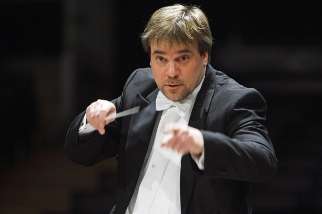|
Back
Mr. Storgårds’ Mighty Sibelius New York
David Geffen Hall, Lincoln Center
05/12/2016 - & May 13, 14, 2016
Robert Schumann: Genoveva Overture, opus 81
Gustav Mahler: Selections from Das Knaben Wunderhorn: “Revelge”, “Trost im Unglück”, Der Schildwache Nachtlied”, “Lied des Verfolgten im Turm”, “Des Antonius von Padua Fischpredigt” & “Der Tamboursg’sell”
Jean Sibelius: Symphony No. 2 in D Major, Opus 43
Michelle DeYoung (Mezzo-soprano)
New York Philharmonic Orchestra, John Storgårds (Conductor)

J. Storgårds (© Heikki Tuuli)
To look at Conductor John Storgårds résumé, it seems impossible that this is his first performance with the New York Philharmonic. The Finnish-born artist has been Principal Guest Conductor of the BBC Philharmonic, Chief Conductor of the Helsinki Phil, has appeared with every orchestra in Europe, Australia and Canada, as well as our Cleveland, Boston and Houston orchestras. And just for good measure, he is the Artistic Director of the Lapland Chamber Orchestra, with which he makes recordings of Finnish and Scandinavian composers.
Still, such résumés can prove deceiving once in front of the New York Philharmonic, and I attended this first of three concerts just to see how he would handle six songs from Mahler’s Youth’s Magic Horn.
He was fine there, and especially fine in the Wagner-style Overture to Genoveva by Robert Schumann. (Those quadruple horn-fanfares could have come from Siegfried.) But the astounding surprise came where I least expected it, after the intermission.

M. DeYoung (© Christian Steiner)
The Mahler, though, originally with singer-in-residence Eric Owens, was changed due to illness to the always reliable Michelle DeYoung.
Ms. DeYoung is mezzo-soprano, and Mahler had originally called for a contralto. But her range is a wide one, and her voice always glorious. Still, some of these songs call for male and female, and I really did like Leonard Bernstein’s decision to put Christa Ludwig and Walter Berry together to hold the songs together.
Nonetheless, this music is wondrous. Totally different from Mahler from the night before, the amorphous puzzling Tenth Symphony. The complete Das Knaben Wunderhorn is a thesaurus of fable and legend, medieval tales, death rattles and more than a few anti-military anthems.
Ms. DeYoung gave her all to the mordant “Tralali, tralaley, trallarlera” of “Reveille”, played both Hussar and Girl in the “Solace in Misfortune”, and lightened up delightfully in the familiar “St. Anthony Preaching to the Fish”.
In the final song of the drummer boy fated to die on the gallows, one heard in her voice and the orchestra the whole Middle Ages attitude to fate and death together.
After this strong performance, I was simply not prepared for Conductor Storgårds performance of that most familiar Sibelius Second Symphony. Virtually every conductor goes through the paces, leading to the series of last-movement crescendos. Mr. Storgårds had no intention of doing that. I have rarely seen a conductor so fiercely concerned with every single measure of this work. It wasn’t simply his dramatic gestures, but what he could wring out of the New York Phil.
It started tensely enough, but when Mr. Storgårds attacked (with no room between the first two movements) that theme in the Andante that one’s hair symbolically stood on edge. It wasn’t that he slowed the tempo down, but that he pushed for every single solo instrument to pull and push, urging forward as though the fate of the world stood on having each measure a dramatic episode.
Perhaps in another symphony, this might have broken up the structure. But early Sibelius was all too aware of symphonic structure, and by goading the orchestra, giving it plenty of rubato and pulling it in, he created a Second Symphony the likes of which I had never heard.
Needless to say, those climaxes in the Finale were suitably loud, the varied timpani blows were clear, the entire string section bowed hard and bowed triumphantly.
Gustav Mahler, who had minimal use for Sibelius’ music, methinks would have approved this performance. The Austrian felt that music should not encompass a single idea but should embrace the world. John Storgårds attempted that feat and very well came close to succeeding.
Harry Rolnick
|